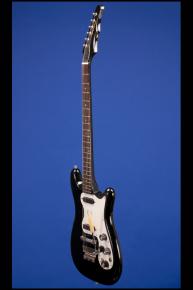An All Original Sixties Custom Color two pickup Epiphone Olympic.
This custom-color 1965 Olympic 722D weighs just 5.50 lbs. Asymmetrical double cutaway, one-piece solid mahogany body and one-piece mahogany neck with a rosewood fretboard, 22 original jumbo frets and pearl dot position markers. "Batwing" headstock with "Epiphone" silkscreened in gold on face. Serial number "334620" stamped in blind on back of headstock. Three-layer black over white plastic 'bell-shaped' truss rod cover with two screws. Six-in-a-row (strip) 'double-line' Kluson Deluxe tuners with white plastic oval buttons. The scale length is the standard Gibson 24 3/4 inches, the nut width is just over 1 9/16 inches and the neck has a very comfortable medium profile. Two Melody Maker single-coil pickups with nice, balanced outputs of 7.19k and 7.15k. Single-layer white plastic pickguard with inlaid silver Epiphone 'Epsilon' and nine screws. Four controls (two volume, two tone) plus three-way selector switch and jack socket, all on pickguard. Black plastic ribbed-sided knobs with metal tops with red markings. The potentiometers are stamped "134 6532" (Centralab, August 1965). Combination ridged "wrap-over" bridge, factory Epiphone Maestro Vibrola tailpiece with 'walrus-tooth' tremolo arm. Apart from some light finish checking, this remarkable little guitar is in exceptionally fine (9.00) condition with just a few minor surface marks, mainly on the sides of the body. Housed in the original Epiphone three-latch, shaped, gray softshell case with blue felt lining with handle broken (8.50).
CMI (Gibson) took over the New York Epiphone company in 1957. They bought the tooling, the parts and even the unfinished guitars. In the sixties, Gibson and Epiphone instruments were made side by side in Kalamazoo, both using the same woods, construction methods and many of the same components. Many Epiphone models had a Gibson equivalent that sold at more or less the same price. The Olympic was Epiphones best selling guitar, with almost 10,000 instruments shipped from Kalamazoo between 1960 and 1969. Epiphone guitars quickly found favor in the mid-1960s music scene with many bands like The Beatles, The Rolling Stones, The Animals and The Kinks all playing various models of Epiphone guitars.
According to a 1965 Epiphone price, list the sunburst/cherry version of this guitar sold for $189.50. Custom colors were always a little more expensive.











